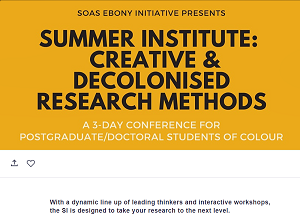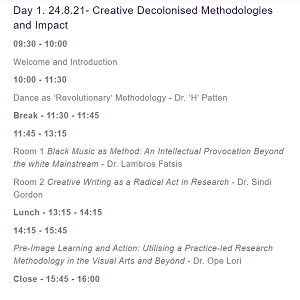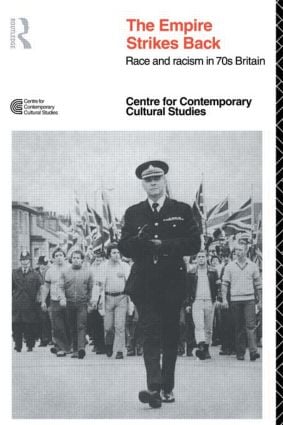 On Instagram recently, an event caught my eye: epitomising some of the differences I have begun to think through about ways that global majority scholars go about our research. Even the fact that the event was being advertised on Instagram, rather than just via a scholarly email list, was different. The programme is not aimed at peers with influence in the editing boards of prestigious journals, but at PhD and doctoral researchers: at reaching out to upcoming scholars. It offers different approaches to research: dance, music and creative writing as method; finding your 'voice', community transformation in research (Ebony Initiative, 2021).
On Instagram recently, an event caught my eye: epitomising some of the differences I have begun to think through about ways that global majority scholars go about our research. Even the fact that the event was being advertised on Instagram, rather than just via a scholarly email list, was different. The programme is not aimed at peers with influence in the editing boards of prestigious journals, but at PhD and doctoral researchers: at reaching out to upcoming scholars. It offers different approaches to research: dance, music and creative writing as method; finding your 'voice', community transformation in research (Ebony Initiative, 2021).
 During my own research career, initially as a PhD student, now as an academic educator, I have been conscious of struggling to fit my ideas into mainstream academic writing. Here I reflect on some of the different ways in which those from the 'global majority' might slip through 'global minority'/'global North' (Europe, USA, Australasia) ways of measuring and capturing academic thought. This makes us look as if we are not achieving well in the ivory tower of a white higher education system.
During my own research career, initially as a PhD student, now as an academic educator, I have been conscious of struggling to fit my ideas into mainstream academic writing. Here I reflect on some of the different ways in which those from the 'global majority' might slip through 'global minority'/'global North' (Europe, USA, Australasia) ways of measuring and capturing academic thought. This makes us look as if we are not achieving well in the ivory tower of a white higher education system.
Referencing - "standing on the shoulders of giants".
Ironically, the difficulty I have referencing the sources for my ideas has given me a powerful awareness of the importance of global North referencing systems. I lay strong emphasis on referencing with my own students.
Newton (referencing other scholars! he may have been drawing on a seventeenth century writer: Robert Burton, or the twelfth century bishop Bernard de Chartres - who was drawing on the Roman Priscian), said in a letter: "if I have seen further it is by standing on the shoulders of giants". To my own students, I explain that their own idea may be good but it will surely be even bigger and better if they can build it on the work of previous thinkers. Testing out our thinking both in line with and against the thinking of others is the standard means by which academic writing is built up in the global North. We both demonstrate this development of thinking, and affirm it, and undertake it, through referencing. By describing my view of academic thinking as built on that of Newton, I am able to use his tried and tested metaphor and also to get authority for the idea.
But what if there isn't a written source which we can reference? Much of my own early thinking about the intertwining of race politics, sexuality and feminism came from intense discussions I was part of in the black lesbian 'community' in London ('black' then having a political meaning which now might be covered by 'people of colour'), from attending performance art shows and photography exhibitions at which I absorbed ideas that were not conveyed in words. Although in many instances these radical thinkers and activists were drawing on books and essays (Moraga and Anzaldua (eds), 1981; hooks, 1981; Lorde, 1983), they gave these a British inflection and we developed the ideas in them in discussion. I still write with these ideas in mind, but I can't acknowledge them in the standard way. (In some cases, I only managed to afford to put the books on my shelves some years after absorbing and using their ideas.)
In the writing of my students from a global majority background I also see them drawing on lived experience and verbal discussion with family and friends. The global majority experience is rarely documented for us to reference so their argument can be rich and nuanced, but the marking scheme may make it look as if it is thin and poorly substantiated. (One solution here is to add some of the references from material that is ostensibly from a global minority perspective, and which supports the case being made - this then allows the argument to be rewarded with the marks it deserves.)
I'm not saying that referencing is not a good way of working out academic thought; only that there are other (black and minority ethnic) ways of developing thinking which it's difficult to properly recognise in a white dominant mode of writing. (Similar ideas have been expressed about women's writing by Henrietta Moore (1994). You can see here how I lend my idea about a different mode of writing among global majority scholars and students authority by referencing the published thinking of a white author on gender.)
Collaborative writing - the Empire Strikes Back.
 In 1982, a collection of essays was published by a group of young scholars at Birmingham University. Unlike other scholarly collections, it didn't bear the names of individuals who had edited it. It has to be referenced as (Centre for Contemporary Cultural Studies, 1982). Inside, the scholars wrote of the way in which all had influenced each piece of writing, of how they had supported each other and thought through ideas being offered together. They didn't want to claim individual acknowledgement for the collection, they wanted to acknowledge their collaborative approach to writing.
In 1982, a collection of essays was published by a group of young scholars at Birmingham University. Unlike other scholarly collections, it didn't bear the names of individuals who had edited it. It has to be referenced as (Centre for Contemporary Cultural Studies, 1982). Inside, the scholars wrote of the way in which all had influenced each piece of writing, of how they had supported each other and thought through ideas being offered together. They didn't want to claim individual acknowledgement for the collection, they wanted to acknowledge their collaborative approach to writing.
This is in stark contrast to the mainstream global minority academic publishing world. It is key in academia to be known as the author of internationally significant texts. Unscrupulous practices: naming lists of those who have had little to do with the research being written about, are common. Many stratagems for getting work into high level journals are exercised. This is because major funding is attached to being able to contribute to your own institution's Research Excellence Framework - which is based not on your actual research but on your published records of it. There are complaints that the work rewarded in a funding framework which is strongly supported by the older Higher Education Institutions (some of them are very old!), can be derivative, repeating itself and contributing little to change or scientific innovation in a struggling postmodern society.
Playing the game
I wrote one article once that was capable of being put into the REF. I happened to be working for a short period in what's known as a 'Russell Group' university, where I was amazed at the conveyor-belt efficiency of the support provided for writing up REF-able academic articles. A colleague asked me in flattering accents to present some of my PhD research at their seminar series. When I had done that, and we had all enjoyed a meal out afterwards (it was a struggle to pay for my share, but it was nice to get out), he suggested I write up my presentation for a journal housed in the department - he was on the editorial board. I don't know who the kind person was who reviewed my article but their comments allowed me to transform my thinking, and they had even heard of a book which had relevance to my ideas - which I could reference properly. It was a wonderful, supportive experience.
Unfortunately it was at complete variance with other publishing experiences I had. I was variously accused of plagiarism and under-referencing (!). I had comments on my paper about minority ethnic kinship patterns asking why I was not talking about community and security (because I'm writing about sexuality and kinship?).
Not playing the game
As it became clear I was not going to progress in academia, I fell back on my teaching skills - I currently enjoy a richly rewarding teaching job. I lost the will to battle in what I found to be a sycophantic and bullying academic publishing culture, completely detached from community activism (academic journal articles are of no interest to my employer anyway). I write blogposts like this one, where I can focus on my lived experience (and which can be cited - I become my own written authority!). I write articles for accessible education platforms like OpenLearn and other more populist pieces - getting a far bigger readership and impact than through academic journals. I became a school governor, and then the member of a local government equality taskforce.
Can we bring on board global majority thought in an academic system which is set up to recognise centuries of global minority thought? I don't want to throw out referencing altogether. I believe we can find newly developing open and accessible means of publishing and disseminating work (Weller, 2014), which will support more diverse ways of writing up research.
References
Centre for Contemporary Cultural Studies, (1982). The Empire Strikes Back: Race and Racism in 70s Britain. London: Hutchinson.
Ebony Initiative, 2021. 'Creative & Decolonised Research Methods', Details available at: https://www.eventbrite.com/e/ebony-initiative-summer-institute-creative-decolonised-research-methods-tickets-163528085907 (accessed 8/8/2021).
hooks, b. (1981). Ain't I a Woman: black women and feminism. Boston: Southend Press.
Lorde, A., (1983). Zami: A New Spelling of My Name. Trumansburg, New York: The Crossing Press.
Moore, H. (1994). A Passion for Difference. Cambridge: Polity Press.
Moraga, C. and Anzaldua, G.E. (1981) (eds.). This Bridge Called My Back: Writings by Radical Women of Color. Watertown, Mass: Persephone Press.
Weller, M. (2014). The battle for open: how openness won and why it doesn’t feel like victory. Ubiquity Press.